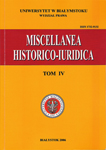Problematyka konkubinatu w uchwałach soborów powszechnych XII–XVI wieku
The Problem of Concubinage in the Resolutions of Ecumenical Councils in 12th-16th Centuries
Author(s): Krzysztof SzczygielskiSubject(s): Christian Theology and Religion, Law, Constitution, Jurisprudence, 6th to 12th Centuries, 13th to 14th Centuries, 15th Century, 16th Century, Penal Policy
Published by: Wydawnictwo Uniwersytetu w Białymstoku
Summary/Abstract: The resolutions of ecumenical councils in 12th-16th centuries referred to problem of concubinage very often. According to them, the concubinatus was a sin and crime, so it should have been condemned and punished. The concubinage was penalized in both situations – when it concerned priests and other members of the Catholic Church. The fight against concubinage had a purpose to preserve good opinion about priests and the dignity of the institution of Christian marriage. What regards priests, there was a whole set of canonical sanctions, starting from penalty affecting property and ending with the privation of office and dignities. Exceptionally penalty of imprisonment (poena carceris) was used. What regards laymen, only penalties ferendae sententiae were applied. To make the penalization more effective, bishops could ask state authorities for help (auxilium brachium saeculare). The resolutions also mentioned about impediment to marriage due to affinity, which existed when copula carnalis took place. Many of those norms have been used until 1917, when the first code of canon law was promulgated.
Journal: Miscellanea Historico-Iuridica
- Issue Year: 4/2006
- Issue No: 1
- Page Range: 41-57
- Page Count: 17
- Language: Polish

